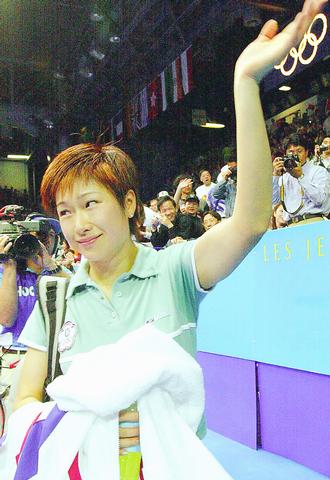Turning her loss on Saturday around, Chen Jing (陳靜) yesterday beat Singapore's Jing Jun Hong (
The first set between Chen and Jing was a close one with Jing winning 21-18. Chen gave away eight points in the match because of unforced errors and at first appeared visibly shaken. Chen is currently ranked third in the world, while Jing is ranked 23rd.
"In the first game I missed a few good opportunities and that disrupted my strategy and rhythm. She [Jing] attacked harder than she normally would and I was standing too far away from the table to counter attack," Chen said after the match. "I made several errors and became frustrated."

PHOTO: LIN CHENG-KUNG, TAIPEI TIMES
But after the first set, Chen started playing more aggressively, using fast play and hard smashes to put Jing off her rhythm. Chen dominated in the three sets that followed, winning 21-14, 21-15, 21-10. In the third set Chen racked up 12 points because of Jing's bobbles.
Yesterday's medal was Chen's third in Olympic competition. Chen won the gold at the 1988 Seoul Olympics, at the time competing for China. She moved to Taiwan in 1991 and competed in the 1996 Olympics, winning a silver in women's singles.
"The first time I was young and full of confidence. I knew I could win because I was representing China and I was technically the best. This time I wanted to challenge myself because these are the `Games of the new millennium.' I was confident with my technique this time. It seems that physically I'm still comparable to those playing now. But if I had won yesterday, that would have been even better," she said, when asked how she felt about winning her third Olympic medal.
Coming to Taiwan has had its challenges, Chen said yesterday, comparing the training conditions in both countries.
"I don't have as many training partners now for me to practice all the styles," Chen said.
When asked whether she would come back again in four years to try and win another Olympic medal in Athens, Chen said: "I don't know, I'll have to ask God."

INVESTIGATION: The case is the latest instance of a DPP figure being implicated in an espionage network accused of allegedly leaking information to Chinese intelligence Democratic Progressive Party (DPP) member Ho Jen-chieh (何仁傑) was detained and held incommunicado yesterday on suspicion of spying for China during his tenure as assistant to then-minister of foreign affairs Joseph Wu (吳釗燮). The Taipei District Prosecutors’ Office said Ho was implicated during its investigation into alleged spying activities by former Presidential Office consultant Wu Shang-yu (吳尚雨). Prosecutors said there is reason to believe Ho breached the National Security Act (國家安全法) by leaking classified Ministry of Foreign Affairs information to Chinese intelligence. Following interrogation, prosecutors petitioned the Taipei District Court to detain Ho, citing concerns over potential collusion or tampering of evidence. The

NEGOTIATIONS: Taiwan has good relations with Washington and the outlook for the negotiations looks promising, Minister of Economic Affairs J.W. Kuo said Taiwan’s GDP growth this year is expected to decrease by 0.43 to 1.61 percentage points due to the effects of US tariffs, National Development Council (NDC) Minister Paul Liu (劉鏡清) said at a meeting of the legislature’s Economics Committee in Taipei yesterday, citing a preliminary estimate by a private research institution. Taiwan’s economy would be significantly affected by the 32 percent “reciprocal” tariffs slapped by the US, which took effect yesterday, Liu said, adding that GDP growth could fall below 3 percent and potentially even dip below 2 percent to 1.53 percent this year. The council has commissioned another institution

TRADE: The premier pledged safeguards on ‘Made in Taiwan’ labeling, anti-dumping measures and stricter export controls to strengthen its position in trade talks Products labeled “made in Taiwan” must be genuinely made in Taiwan, Premier Cho Jung-tai (卓榮泰) said yesterday, vowing to enforce strict safeguards against “origin laundering” and initiate anti-dumping investigations to prevent China dumping its products in Taiwan. Cho made the remarks in a discussion session with representatives from industries in Kaohsiung. In response to the US government’s recent announcement of “reciprocal” tariffs on its trading partners, President William Lai (賴清德) and Cho last week began a series of consultations with industry leaders nationwide to gather feedback and address concerns. Taiwanese and US officials held a videoconference on Friday evening to discuss the

NEGOTIATIONS: The US response to the countermeasures and plans Taiwan presented has been positive, including boosting procurement and investment, the president said Taiwan is included in the first group for trade negotiations with the US, President William Lai (賴清德) said yesterday, as he seeks to shield Taiwanese exporters from a 32 percent tariff. In Washington, US Trade Representative Jamieson Greer said in an interview on Fox News on Thursday that he would speak to his Taiwanese and Israeli counterparts yesterday about tariffs after holding a long discussion with the Vietnamese earlier. US President Donald Trump on Wednesday postponed punishing levies on multiple trade partners, including Taiwan, for three months after trillions of US dollars were wiped off global markets. He has maintained a 10 percent